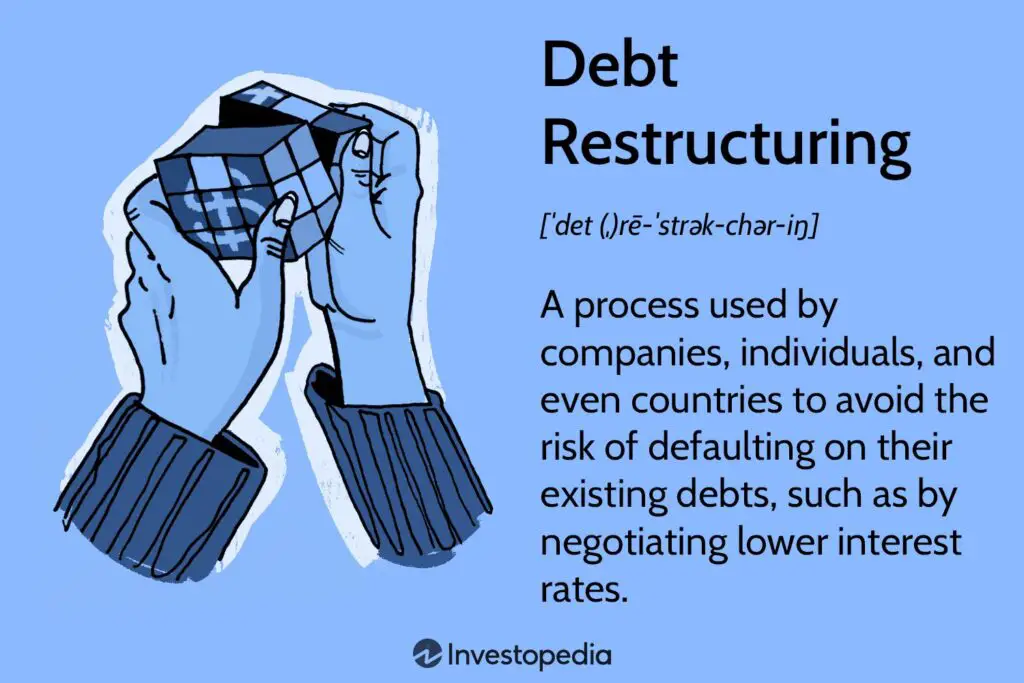Debt refinancing – it’s a term you may have heard before, but do you truly understand what it means and when it’s worth considering? In simple terms, debt refinancing is the process of replacing your current debt with a new loan that offers better terms and conditions. It can be a smart financial move that allows you to save money, reduce your monthly payments, or even pay off your debt sooner. But how do you know if it’s the right choice for you? Let’s delve into what debt refinancing entails and explore the situations in which you should seriously consider it.
What is Debt Refinancing and When to Consider It
Introduction
Debt refinancing can be a useful strategy for individuals and businesses alike to manage their debt more effectively. It involves replacing an existing loan or debt obligation with a new loan that has different terms and conditions. The goal of debt refinancing is usually to obtain more favorable interest rates, lower monthly payments, or extend the repayment period. This article will delve into the details of what debt refinancing entails and explore various situations where it may be beneficial to consider refinancing your debt.
Understanding Debt Refinancing
Debt refinancing is essentially the process of taking out a new loan to pay off an existing debt. The new loan is used to cover the outstanding balance of the old loan, effectively replacing it. The terms of the new loan often differ from the original loan, providing the borrower an opportunity to improve their financial situation. Here are a few key aspects to understand about debt refinancing:
1. Lower Interest Rates
One of the primary reasons individuals and businesses choose to refinance their debt is to lower the interest rates. If the current interest rates in the market are significantly lower than what you are currently paying on your loans, it might be a good time to consider refinancing. By obtaining a new loan with a lower interest rate, you can reduce the overall cost of borrowing and potentially save a substantial amount of money over the life of the loan.
2. Lower Monthly Payments
Another advantage of debt refinancing is the potential to reduce your monthly payments. By extending the repayment period, you can spread out your loan payments over a longer duration, resulting in smaller installments each month. This can be especially helpful if you find yourself struggling to meet your current monthly payment obligations. However, it is important to consider the overall cost of the loan when opting for lower monthly payments, as extending the repayment period may increase the total amount of interest paid over time.
3. Improved Cash Flow
Debt refinancing can also help improve your cash flow by freeing up additional funds each month. If you are currently paying high-interest rates on multiple debts, consolidating them into a single loan with a lower interest rate can reduce the total monthly repayment amount. With the extra cash available, you can allocate resources towards other financial goals such as investments, savings, or business expansion. This increased cash flow can have a significant positive impact on your overall financial well-being.
4. Change in Loan Terms
When considering debt refinancing, it is crucial to review and analyze the terms and conditions of both your current loan and the new loan. The new loan may present an opportunity to restructure or modify the terms of your debt. For example, you might opt for a fixed-rate loan instead of a variable-rate loan to provide stability and predictability in your monthly payments. Additionally, you may also have the option to change the repayment period or choose other features that better align with your financial goals and circumstances.
When to Consider Debt Refinancing
While debt refinancing can be an advantageous strategy, it is important to carefully evaluate your personal or business financial circumstances before deciding to refinance. Here are some situations where it may be beneficial to consider debt refinancing:
1. Improved Credit Score
If your credit score has significantly improved since you first obtained your loan, you may qualify for better loan terms and interest rates. Lenders often offer more favorable terms to borrowers with a higher credit score, as they are considered less risky. Before refinancing, check your credit score and assess if it has improved. If it has, refinancing could help you secure a loan with lower interest rates and potentially save money.
2. Lower Interest Rates
As mentioned earlier, declining interest rates in the market can be an opportune time to consider refinancing. If the current interest rates are noticeably lower than what you are currently paying, exploring refinancing options could help you lock in a lower rate and save on interest expenses over time. However, it is essential to calculate any associated fees or costs of refinancing to ensure that the savings outweigh the refinancing expenses.
3. Change in Financial Situation
Significant changes in your financial situation, such as an increase in income or a decrease in expenses, can also warrant debt refinancing. If you are in a better financial position now compared to when you initially acquired the debt, refinancing can enable you to take advantage of the improved circumstances. For example, you may consider refinancing to shorten the repayment period and pay off the debt more quickly if you can afford higher monthly payments.
4. Debt Consolidation
Debt consolidation is another common reason for considering refinancing. If you have multiple loans or debts with high-interest rates, consolidating them into a single loan can simplify your financial management and potentially reduce the overall interest expenses. Instead of juggling multiple payments and due dates, a single monthly payment can streamline your finances and make it easier to stay on top of your debt obligations.
Debt refinancing can be a valuable tool for individuals and businesses to manage their debt more effectively. By understanding the intricacies of debt refinancing and considering the appropriate scenarios to pursue it, you can make informed decisions about your financial future. Whether you aim to lower interest rates, reduce monthly payments, improve cash flow, or modify loan terms, debt refinancing can provide the opportunity to achieve your financial goals. It is essential to carefully consider the potential benefits, costs, and impact on your overall financial situation before proceeding with debt refinancing. Seek advice from financial professionals if needed to ensure that your refinancing choices align with your unique circumstances and long-term objectives.
What is debt refinancing?
Frequently Asked Questions
Frequently Asked Questions (FAQs)
What is debt refinancing?
Debt refinancing refers to the process of replacing an existing debt obligation with a new debt, usually at more favorable terms. This is often done to obtain better interest rates, extend the repayment period, or change the type of debt instrument.
When should I consider debt refinancing?
Debt refinancing should be considered when you want to improve your financial situation or take advantage of better loan terms. Some common situations where it may be beneficial include when interest rates have dropped since you acquired the debt, when your credit score has improved, or when you need to reduce your monthly payments.
How does debt refinancing work?
When you opt for debt refinancing, you apply for a new loan that will be used to pay off your existing debt. The new loan comes with revised terms and conditions that are more favorable to you. Once the new loan is approved, the funds are used to settle the old debt, and you start making payments on the new loan.
What are the potential benefits of debt refinancing?
Debt refinancing can offer several benefits, including lower interest rates, reduced monthly payments, improved cash flow, simplified debt management, the ability to consolidate multiple debts into one, and the potential to shorten or extend the repayment period based on your financial goals.
Are there any fees associated with debt refinancing?
Yes, there might be fees associated with debt refinancing. These can include application fees, origination fees, appraisal fees, legal fees, and prepayment penalties. It’s important to carefully consider these fees and compare them with the potential savings or benefits you are expected to gain from refinancing.
Can I refinance all types of debt?
Debt refinancing is possible for many types of debt, including mortgages, auto loans, personal loans, student loans, and credit card debt, among others. The eligibility and available options may vary depending on the type of debt and your financial circumstances.
How do I determine if it’s the right time for debt refinancing?
To determine if debt refinancing is right for you, consider factors such as current interest rates, the remaining term of your existing debt, your credit score, any changes in your financial situation, and your long-term financial goals. It may also be helpful to consult with a financial advisor or loan specialist.
What steps should I take to refinance my debt?
To refinance your debt, start by assessing your current debt situation and financial goals. Research and compare loan options from different lenders to find the most favorable terms. Calculate the potential savings and costs involved in refinancing. Prepare the necessary documentation and submit a refinancing application. Once approved, use the new loan to pay off your existing debt and begin making payments according to the new terms.
Final Thoughts
Debt refinancing is a financial strategy that involves replacing existing debt with a new loan. It can help individuals and businesses reduce their interest rates, lower monthly payments, and improve their overall financial situation. When considering debt refinancing, it is important to assess the current interest rates, credit score, and financial goals. If interest rates have significantly dropped since the original loan was obtained, or if the borrower’s credit score has improved, debt refinancing could be a viable option. By carefully evaluating these factors, individuals and businesses can determine if debt refinancing is the right choice for them.

